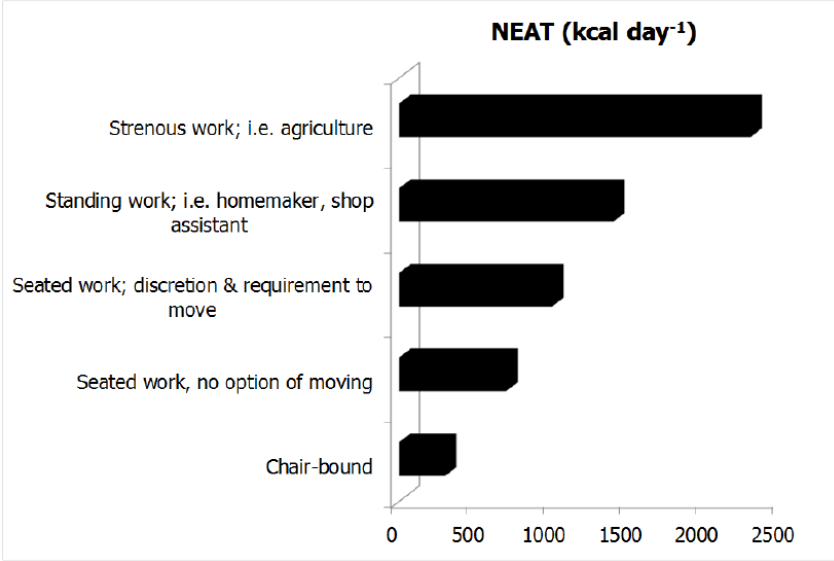Is NEAT The Secret to Weight Loss?
We all have a skinny friend who eats enough for two people, but never gains a pound. Let's call him Scott. And then there is another friend who gains weight at the sight of food. We will call him Dan. So what gives? How can Scott crush cheeseburgers and not gaining a pound?
Most likely, Scott has a much higher activity level than Dan. But it isn't because of exercise; rather, it is due to something called NEAT. NEAT stands for non-exercise activity thermogenesis. It includes the energy expended maintaining and changing posture and other activities of daily living. NEAT hardly gets mentioned in weight loss, but it plays a significant role. Yes, going to the gym and building muscle is essential, but I don’t believe the recommended exercise amount of 150 minutes a week is enough to lose weight.
Move More
Let’s pretend that Dan is your typical office worker who sits nine hours a day. On average, he will burn an extra 50 calories a day from sitting (2). Dan is chair-bound throughout the day, whereas Scott performs strenuous work as a personal trainer. As you can see from the graph below, there is a vast difference in energy expenditure between the two. NEAT has been shown to vary between two people of the same size by up to 2000 calories (3).
(source)
Granted, not everyone has the luxury to have an active job. But that doesn’t mean you can’t reap the benefits of NEAT. For example, in the theoretical model below, Villablanca and colleagues show how simple it is to implement NEAT into a workday. By taking standing and walking breaks, calorie expenditure can increase significantly.
Figure 4 “Implementing nonexercise activity thermogenesis (NEAT): a theoretical model. With increased NEAT at work and during leisure time, a 45-year-old female office worker who is 5 feet 3 inches tall, weighs 180 lb and has a body mass index of 32 could, in theory, reduce weight and BMI over 3 months to healthier levels. She expends 400 kcal while sitting for 8 hours. By progressively increasing standing and walking and adding other NEAT activities during work and leisure time, she can theoretically decrease her BMI from 32 to 27 in 3 months. The dotted line represents the obesity threshold.” (source)
As you can see from the model above, walking produces the highest increase in energy expenditure, whereas sitting produces the lowest. It may seem minor in importance, but research shows sedentary behaviors add up.
"Obese individuals were seated on average, two hours a day longer than lean people. If obese individuals adopted the NEAT-enhanced behaviors of their lean counterparts, they could expend an additional 350 kcal/day from these numerous small low-grade activities and movement (4)."
Over a year the lean counterparts burned over 117,600 more calories (33.6 pounds)! And remember, this isn’t because of exercise, it is due to moving more throughout the day.
You Can't Out-Exercise A Bad Diet
I am not suggesting that you can eat whatever you want and lose weight through increased activity. Trying to out-exercise a poor diet is a bad idea. However, it is important to understand that high activity plays a vital role in the prevention of obesity during excess calorie consumption.
An overfeeding study done by Levine and colleagues proves the importance of NEAT in weight management. Sixteen non-obese subjects were fed an excess of 1000 calories per day for eight weeks. In that time frame, NEAT accounted for a 60% increase in daily energy expenditure. On average, the participants burned about 300 calories due to NEAT. But for one of the subjects, that number increased up to 692 calories (5)!
“Changes in NEAT accounted for the 10-fold differences in fat storage that occurred and directly predicted resistance to fat gain with overfeeding...These results suggest that as humans overeat, activation of NEAT dissipates excess energy to preserve leanness and that failure to activate NEAT may result in ready fat gain.”
If you are wondering how people have enormous appetites and small waists, it could be due to a higher activity level. But it also could be due to other things that we haven’t discovered yet. Remember, the human body is really complex and we still don’t have all the answers. Regardless, it won’t hurt to have a higher activity level on the days you consume more calories. It is never a bad idea to go for a walk after a meal.

